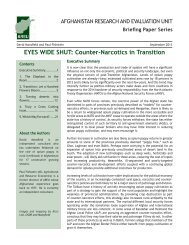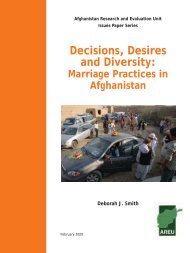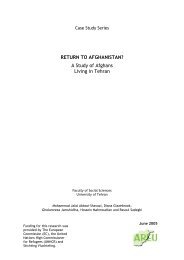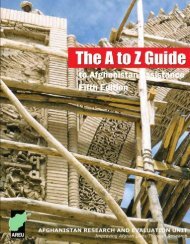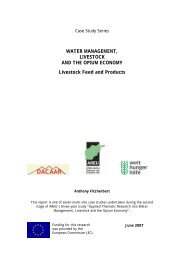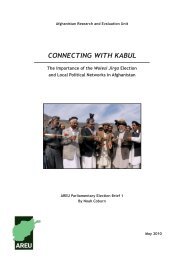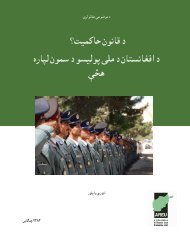Local Governance in Afghanistan: A View from the Ground
Local Governance in Afghanistan: A View from the Ground
Local Governance in Afghanistan: A View from the Ground
- No tags were found...
You also want an ePaper? Increase the reach of your titles
YUMPU automatically turns print PDFs into web optimized ePapers that Google loves.
<strong>Afghanistan</strong> Research and Evaluation Unit<br />
2011<br />
which acknowledges his status upon receipt of a letter of support <strong>from</strong> <strong>the</strong>ir community. Once <strong>the</strong><br />
application is approved, maliks are issued with a stamp. Although <strong>the</strong>ir position rema<strong>in</strong>s subject to<br />
<strong>the</strong> will of <strong>the</strong> people, maliks are commonly hereditary. They are responsible for m<strong>in</strong>or adm<strong>in</strong>istrative<br />
duties such as certify<strong>in</strong>g applications for identity cards, passports or o<strong>the</strong>r government documents,<br />
as well as identify<strong>in</strong>g those eligible for assistance. In some cases <strong>the</strong>y receive payment <strong>in</strong> k<strong>in</strong>d <strong>from</strong><br />
villagers, typically one seer (seven kg) of wheat per family per year. They are not paid by government<br />
but make up for this by charg<strong>in</strong>g to endorse applications. Although <strong>the</strong>ir <strong>in</strong>fluence has been wan<strong>in</strong>g,<br />
some ma<strong>in</strong>ta<strong>in</strong> <strong>the</strong>ir former status and o<strong>the</strong>rs play a role <strong>in</strong> <strong>the</strong> various types of shura that exist. The<br />
status of <strong>the</strong> malik also varies depend<strong>in</strong>g on <strong>the</strong> local dynamics of a given area. In Taliban-controlled<br />
areas <strong>the</strong>ir status was much dim<strong>in</strong>ished; <strong>in</strong> Jawzjan <strong>the</strong> qaryadar (<strong>the</strong> local term for a malik) had<br />
a formal function <strong>in</strong> ma<strong>in</strong>ta<strong>in</strong><strong>in</strong>g security; and <strong>in</strong> neighbour<strong>in</strong>g Sar-i-Pul many government officials<br />
distrusted <strong>the</strong>m.<br />
6.4 Political parties<br />
Political parties <strong>in</strong> <strong>Afghanistan</strong>, as <strong>in</strong> most post-conflict states, straddle <strong>the</strong> divide between <strong>the</strong> legal<br />
and <strong>the</strong> extra-legal. Accord<strong>in</strong>g to <strong>the</strong> political scientist James Fearon, political groups suffer <strong>from</strong><br />
a deficit of trust <strong>in</strong> an environment of anarchy. 92 Ra<strong>the</strong>r than expos<strong>in</strong>g <strong>the</strong>mselves to vulnerability,<br />
he suggests <strong>the</strong>y prefer to compete with o<strong>the</strong>r political groups—firstly, to protect <strong>the</strong>mselves, and<br />
secondly, to access resources for <strong>the</strong>ir supporters. Such dynamics assume a significantly different<br />
character <strong>in</strong> <strong>Afghanistan</strong> where, partly as a result of <strong>the</strong> deficiencies of SNTV, 93 political competition<br />
is more <strong>in</strong>tense <strong>in</strong> <strong>the</strong> non-electoral sphere. 94 In prov<strong>in</strong>ces and districts, political parties fight—<br />
sometimes literally—over appo<strong>in</strong>tments to government positions and over <strong>the</strong> distribution of resources.<br />
Antagonisms between political parties <strong>in</strong> most cases are historical and reflect <strong>the</strong> circumstances<br />
surround<strong>in</strong>g <strong>the</strong>ir evolution <strong>from</strong> tanzims (political organisations) and mujahidd<strong>in</strong> factions formed<br />
<strong>in</strong> opposition to Soviet occupation and People’s Democratic Party of <strong>Afghanistan</strong> (PDPA) rule. As can<br />
be seen <strong>from</strong> <strong>the</strong> evidence presented below, such parties aggressively mobilise ethnic, sectarian and<br />
tribal identities both with<strong>in</strong> and outside of <strong>the</strong> electoral arena, and <strong>the</strong>ir patrons are driven by <strong>the</strong><br />
parochialism <strong>the</strong>se identities encourage. 95 Such behaviour stems more <strong>from</strong> people mak<strong>in</strong>g rational<br />
choices than <strong>from</strong> ideological differences between parties.<br />
This dynamic occurs even <strong>in</strong> prov<strong>in</strong>ces with clear ethnic majorities, such as Hazara-majority Day<br />
Kundi which mirrors <strong>the</strong> national level confusion of <strong>the</strong> Shia political movements. 96 Hizb-i-Wahadat<br />
(Khalili faction), Hizb-i-Wahadat (Mohaqiq faction), Harakat-i-Islami and Insijam-i-Milli are present,<br />
each with 5,000 or more registered members. 97 A member of <strong>the</strong> prov<strong>in</strong>cial council and <strong>the</strong> prov<strong>in</strong>cial<br />
head of Hizb-i-Wahadat (Mohaqiq) confessed <strong>the</strong>re was very little difference 98 between <strong>the</strong> two Hizb-<br />
92 James D. Fearon, “Commitment Problems and <strong>the</strong> Spread of Ethnic Conflict,” <strong>in</strong> Lake and Rothchild, (eds.), The<br />
International Spread of Ethnic Conflict: Fear, Diffusion, and Escalation (New York: Pr<strong>in</strong>ceton University Press, 1998), 108-123.<br />
93 In defence of <strong>the</strong> SNTV, Karzai has said that political parties rem<strong>in</strong>ded people of communist rule and that <strong>the</strong>y should not<br />
be revived. See: Barfield, <strong>Afghanistan</strong>: A Cultural and Political History, 301.<br />
94 Barnett Rub<strong>in</strong> presents a nuanced argument of how rivalries between ethnicities, relationships between political elites,<br />
opposition to Soviet control by clerics and <strong>the</strong> consequent struggle for power between political factions resulted <strong>in</strong> <strong>the</strong><br />
collapse of <strong>the</strong> Afghan state. See: Barnett R. Rub<strong>in</strong>, The Fragmentation of <strong>Afghanistan</strong>: State Formation and Collapse <strong>in</strong> <strong>the</strong><br />
International System (Yale: Yale University Press, 1995).<br />
95 For a description of qawms and explanation of how primordial identities take precedence over ethnicity, see: Olivier<br />
Roy, “Islamic Militancy: Religion and Conflict <strong>in</strong> Central Asia,” <strong>in</strong> M. Mekenkamp, P. van Tongeren and H. van de Veen, (eds.),<br />
Search<strong>in</strong>g for Peace <strong>in</strong> Central and South Asia: An Overview of Conflict Prevention and Peacebuild<strong>in</strong>g Activities (Boulder/<br />
London: Lynne Rienner Publishers, 2002).<br />
96 Niamatullah Ibrahimi attributes <strong>the</strong> unravell<strong>in</strong>g of Hizb-i-Wahadat and <strong>the</strong> growth of a number of Shia political parties<br />
to differences <strong>in</strong> political strategy and personality-based agendas. For a history of <strong>the</strong> formation of Hizb-i-Wahadat and its<br />
division <strong>in</strong>to several factions, see: Niamatullah Ibrahimi, “The Dissipation of Political Capital Among <strong>Afghanistan</strong>’s Hazaras,”<br />
Crisis States Work<strong>in</strong>g Papers (Series 2) 51 (London: Crisis States Research Centre, LSE, 2009).<br />
97 The parties had <strong>the</strong> follow<strong>in</strong>g leaders: Hizb-i-Wahadat Islami <strong>Afghanistan</strong>: Kareem Khalili; Hizb-i-Wahadat-i-Islami<br />
Mardum-i-<strong>Afghanistan</strong>: Muhammad Mohaqiq; Harakat-i-Islami <strong>Afghanistan</strong>: Said Mohammad Ali Jawid; Insijam-i-Milli: Sadiq<br />
Mudabeer.<br />
98 For <strong>in</strong>stance, both claimed that <strong>the</strong> disputed district of Gizab was part of Day Kundi.<br />
<strong>Local</strong> <strong>Governance</strong> <strong>in</strong> <strong>Afghanistan</strong>: A <strong>View</strong> <strong>from</strong> <strong>the</strong> <strong>Ground</strong><br />
47



